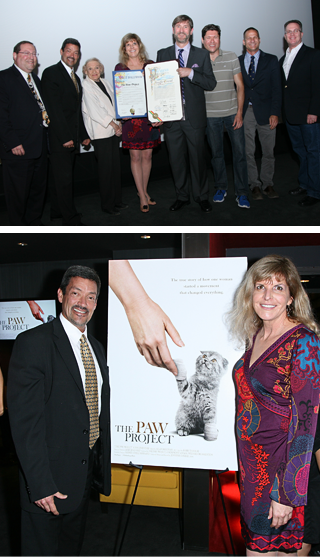– MILESTONES –
THE PAW PROJECT’S ROLE IN ADVOCATING
ANTI-DECLAWING LEGISLATION

Below. The Paw Project’s Dr. Jennifer Conrad and West Hollywood Mayor John Duran at the Pacific Design Center to commemorate the 10th anniversary of landmark anti-declawing legislation passed in West Hollywood.
2022 – Allentown, Pennsylvania City Council unanimously passes an ordinance that prohibits declawing of cats in the city.
2022 – Delaware enacts the third US statewide ban on landlord-mandated declawing of cats.
2022 – Maryland enacts the second US statewide ban on declawing of cats.
2022 – Volusia County, Florida passes an ordinance that prohibits declawing of cats in the unincorporated portions of the county.
2021 – Quebec’s parliament passed a provincial law that prohibits declawing of cats. The law goes into effect in 2023.
2021 – Madison, Wisconsin Common Council unanimously passes an ordinance that prohibits declawing of cats in the city.
2021 – Saskatchewan Veterinary Medical Association (SVMA) votes to prohibit declawing by its membership.
2021 – Pittsburgh, Pennsylvania City Council unanimously passes an ordinance that prohibits declawing of cats in the city.
2021 – St. Louis County Council unanimously passes an ordinance that prohibits declawing of cats in the county.
2021 – Austin, Texas City Council unanimously passes an ordinance that prohibits declawing of cats in the city.
2019 – St. Louis, Missouri City Council votes 21-1 to pass an ordinance that prohibits declawing of cats in the city.
2019 – Manitoba Veterinary Medical Association (MVMA) votes to prohibit declawing by its membership.
2019 – New Brunswick Veterinary Medical Association (NBVMA) votes to prohibit declawing by its membership.
2019 – Alberta Veterinary Medical Association (ABVMA) votes to prohibit declawing by its membership.
2019 – New York passes the first US state law to prohibit declawing of cats.
2018 – Newfoundland & Labrador Veterinary Medical Association (NaLVMA) votes to prohibit declawing by its membership.
2018 – Prince Edward Island Veterinary Medical Association (PEIVMA) votes to prohibit declawing by its membership.
2018 – Nova Scotia legislature passes Bill 27, The Animal Protection Act. Nontherapeutic procedures such as tail docking, ear cropping, declawing, and debarking are not permitted.
2018 – The College of Veterinarians of British Columbia becomes the second province in Canada to ban its members from declawing cats for non-therapeutic reasons.
2017 – The Nova Scotia Veterinary Medical Association (NSVMA) votes to prohibit declawing by membership.
2017 – Denver, Colorado passes an ordinance for the city and county that prohibits declawing of cats. The vote is unanimous.
2014 – Rhode Island enacted a new law, similar to the 2012 California law, that prohibits landlords from requiring tenants to declaw or devocalize their animals.
2012 – California Governor Jerry Brown signed Senate Bill 1229 into law, the first ever state law in the US prohibiting landlords from requiring tenants to declaw or devocalize their animals. Senator Fran Pavley authored the bill, which The Paw Project co-sponsored with HSVMA.
In 2009, The Paw Project led the successful campaigns to legally ban declawing of domestic cats in 7 more California cities. Declawing is now prohibited in eight California cities: West Hollywood, Los Angeles, San Francisco, Burbank, Santa Monica, Berkeley, Beverly Hills and Culver City.
In 2006, The Paw Project was able to convince the USDA, the governing body over animals that are exhibited, bred or sold, to stipulate a regulation in the Federal Animal Welfare Act, prohibiting licensees from declawing or defanging their animals. [USDA Position Paper on Declawing and Defanging]
In 2005, The Paw Project led the campaign to legally ban declawing of wild or exotic cats throughout the entire state of California.
In 2003, Dr. Conrad and The Paw Project team provided data about the debilitating effects of declawing to the American Veterinary Medical Association (AVMA), which then changed its position on declawing of wild and exotic cats to no longer condone it. The Canadian Veterinary Medical Association quickly followed suit.
In 2002, Dr. Conrad approached West Hollywood (California) City Council members and convinced them that declawing of all animals should be banned. The council adopted an anti-declawing ordinance in April 2003 and became the first city in all of North America to ban declawing.

